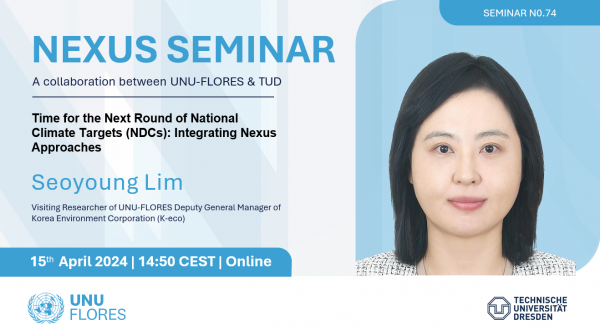Climate change represents the most pressing crisis humanity currently faces, encapsulating a multifaceted challenge that spans environmental, economic, and social aspects. Addressing this complexity necessitates an integrated Nexus Approach, which emphasizes the interlinkages among diverse sectors and stakeholders.
In 2023, the 28th session of the Conference of the Parties (COP28) to the United Nations Framework Convention on Climate Change (UNFCCC) concluded the first Global Stocktake (GST) under the Paris Agreement. The key message from the first GST was simple and clear: we are significantly behind in our efforts to maintain the 1.5℃ goal set by the Paris Agreement.
In response, and pursuant to the outcomes of COP27, countries are mandated to submit their new national climate targets, known as Nationally Determined Contributions (NDCs), for 2035 by early 2025. The Intergovernmental Panel on Climate Change’s Sixth Assessment Report delineates that to meet the Paris Agreement’s 1.5℃ goal, global GHG emissions need to be reduced by 43% by 2030 and 60% by 2035, compared to 2019 levels. Additionally, it highlights a significant gap in adaptation efforts necessitated by the already altered climate conditions. In this regard, the year 2024 is pivotal, as governments are set to initiate the formulation of their new targets for 2035 while implementing their ongoing 2030 targets.
Against this backdrop, this seminar will explore the significance and attributes of the first round of NDCs submitted, showcase standout instances where the Nexus Approach has been effectively reflected, and deliberate on strategies to embed the Nexus Approach more thoroughly in the development of the forthcoming NDCs for 2035.
About the Speaker: Seoyoung Lim
Seoyoung Lim recently joined UNU-FLORES in March as a visiting researcher through the UNU-FLORES and K-eco Fellowship Programme, engaged in a project focusing on the recycling of end-of-life batteries from electric vehicles (EVs).
Since joining K-eco in 2006, she has amassed a broad range of experience that spans from domestic environmental policies, such as the Korea Emission Trading Scheme, to international cooperation efforts, including the UNFCCC and its Paris Agreement. Notably, she served as an advisor to the Korean government on issues related to Nationally Determined Contributions (NDCs) and the international carbon market, known as Article 6 of the Paris Agreement.
Her research focuses on climate change policies, particularly those relevant to GHG emission reductions.
Background of the Series:
UNU-FLORES, in collaboration with PRISMA – Centre for Sustainability Assessment and Policy on behalf of TU Dresden, is excited to announce the Nexus Seminar Series. The joint seminar series, which launched in 2015, features lectures by senior scholars and successful practitioners that highlight all dimensions of research on the Nexus Approach, ranging from hands-on implementation strategies to theoretical debates. The Nexus Seminars serve not only as a platform for scientific exchange and cooperation between UNU-FLORES and TU Dresden but also as a medium for the partner institutions to discuss their research with a broader audience. The Nexus Seminar, which takes place monthly during the academic semester, is open to the public and delivered virtually through online webinars.




